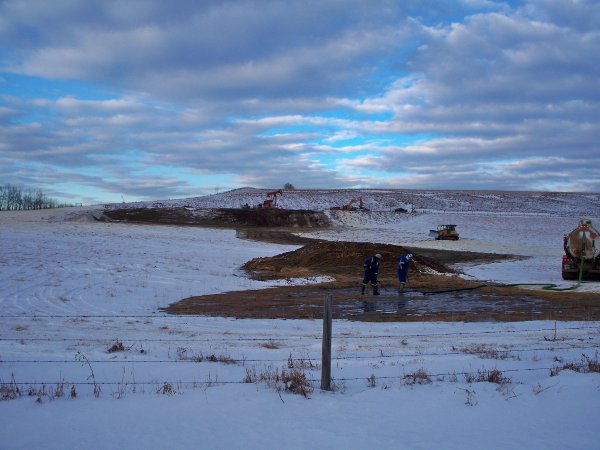We'll Frack Alberta's Next Election, Vow Landowners
Drilling accident fuels rebellion demanding halt to hydraulic fracturing.
![]()

Red Deer River, Alberta: Crew cleans up spill after fracking caused oil well in area to blow. Photo: ASRG Alberta Surface Rights Group.
![]()
Red Deer River, Alberta: Crew cleans up spill after fracking caused oil well in area to blow. Photo: ASRG Alberta Surface Rights Group.
One of Alberta's largest landowner groups says it will make hydraulic fracturing a major election issue this spring if the Alberta government does not act on its request for an immediate moratorium on the controversial industry practice.
Don Bester, president of the Alberta Surface Rights Group, which represents 1,400 landowners, told The Tyee that if the government doesn't "step up to the plate," the group will hold politicians "criminally responsible" for any horizontal drilling incidents that contaminate groundwater or leak poisonous hydrogen sulfide.
Hydraulic fracturing blasts open tight oil, gas and coal formations with highly pressurized volumes of water, sand and undisclosed chemicals in order to release methane or light oil.
The 60-year-old technology has boosted gas and oil reserves but has become the subject of serious government investigations throughout the world, though not in Alberta. Concerns about "fracking" range from measuring the risk of surface and groundwater contamination to its role in causing increased earthquake activity and dangerous methane leaks.
Bester's high profile group called for a full moratorium on hydraulic fracturing last week after a Calgary-based company injected fluids at such high pressure into a 1,800-metre-deep oil formation that the liquids travelled more than 1.2 kilometre underground and ruptured an oil well near Innisfail, Alberta on Jan. 13.
"It was spewing oil 60 feet into the air all around a pump jack well near the Red Deer River," says 65-year-old Bester.
"If these companies can't control these fracks, what is the potential to destroy a complete aquifer with toxic chemicals? We're not convinced that these fracks will stay in the formation that they were intended to crack open," adds Bester.
"The potential to cause cross-communication from the fracking zone to zones that contain active fresh water aquifers is one of the many concerns," warned the group in a public letter to the Alberta government last week.
"The continual denial by the ERCB (Alberta's energy regulator) that this will not happen is very much a concern as every professional geologist knows there are naturally occurring fractures in every formation." Contamination of fresh water aquifers, warned Bester, is "inevitable."
Worrisome evidence mount
Recent U.S. studies in Wyoming and Pennsylvania have shown that the cracking of deep shale formations can strongly increase the risk of methane contamination of well water and groundwater perhaps through wellbores or natural fractures. The mechanisms are not fully understood.
Fracturing of groundwater formations was first reported in Canada in 1986 when "hydraulic fractures propagated into the underlying water zone" in Manitoba.
After the Midway fracking incident the ASRG warned that fracking operations could penetrate nearby sour gas wells resulting in catastrophic releases of toxic hydrogen sulfide (H2S).
"H2S has the extreme potential to cause serious health problems, or even death, to nearby residents that could be totally unaware of a blowout. The dangers of these types of unnoticed incidents that are great distances from the actual fracking site are simply a disaster waiting to happen."
One such fracking episode in Texas sent plumes of sour gas up an abandoned oil well in 2010.
Nearly 30 per cent of Alberta's gas reserves contain the deadly neurological toxin. Incredibly, the ERCB has already approved hydraulic fracturing under a massive sour gas field for a new Calgary well.
Bester says the regulator's response to the Innisfail well blow-out was worrisome. A local farmer tried to alert the Energy Resources Conservation Board about the Jan. 13 incident, but the province's energy regulator failed to answer its emergency phone line.
The farmer, acting on advice from the ASRG, then informed the fracking crew about the well blowout. "They couldn't believe that a frack job could come to surface more than a mile away," says Bester. Yet it is not uncommon for fracking operations to impact gas or oil wells nearly a mile away.
As soon as Midway Energy shut down its fracturing operation, the oil gusher "went down to nothing," says Bester. His group, along with Alberta's New Democrats and other civic associations, want an independent investigation of hydraulic fracturing. (Two MLAs in B.C. have asked for a review of that province's massive shale gas industry, too.)
'That tire will blow'
The ASRG, whose members deal with drilling and fracking crews on a daily basis, also want more transparency on what has now become a routine occurrence in unconventional oil and gas plays: the contamination of existing wells by fracking operations.
"If you inflate a tire designed for 28 pounds of pressure and you put 1,000 pounds in it, that tire will blow," explains Bester, a retired reservoir engineer.
"And that's exactly what happens with to rock formations during hydraulic fracturing operations.... There was so much pressure with the Innisfail frack that the existing nearby well couldn't handle it. "
In 2010 BC's Oil and Gas Commission (OGC) issued a public safety advisory after highly pressurized injections of northern shale reservoirs resulted in 18 incidents of well contamination. One frack operation blasted chemical fluids and sand into another well just 670 metres away.
We'll Frack Alberta's Next Election, Vow Landowners: Page 1 of 2



What have we missed? What do you think? We want to know. Comment below. Keep in mind:
Do:
Do not: